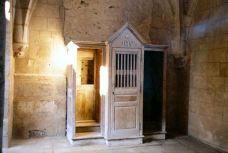 A week-long course at the Vatican began today on the sacrament of penance. Targeted students: young priests.
A week-long course at the Vatican began today on the sacrament of penance. Targeted students: young priests.
Complex or difficult situations in the sacrament will be addressed by Bishop Gianfranco Girotti and Jesuit Father Ivan Fucek, regent and theologian of the (Apostolic P)enitentiary, respectively. Other experts will also address the priests, illustrating “the canonical discipline and its correct application in relation to offenses and punishments and several practical aspects.”
I wonder what sort of “complex” situations will be tackled. Maybe grave serial sins like sexual abuse.

or moving abusive priests around….
Anyway, I suspect this is part of an effort that began a couple of years ago:
Click to access penitentiary_interview.pdf
The response to the Penitentiary Regents answer to the scandal and sin within the church should be expected.
“One cannot undervalue the objective gravity of a series of phenomenon that have been recently denounced and that bring with it the repercussions of human and institutional weakness of the Church; one cannot, however, ignore how it, worried with the grave damage, has redressed and continues to redress with rigorous interventions and initiatives to protect the image of the Church itself and for the good of the people of God. Nevertheless, it is necessary also to denounce the emphasis given to the media that on a daily basis casts discredit on the Church.”
It’s not sexual abuse – it’s a series of phenomenon.
“[the church] continues to redress with rigorous interventions and initiatives to protect the image of the Church itself and for the good of the people of God.” – The priority is to protect the church? And the “good” of the people will only be what the church feeds us?
“denounce the emphasis given to the media” – Again, the church teaches us that we must learn to shield ourselves from the truth.
Perhaps the hierarchy has watched the Wizard of Oz too many times. We are told not to pay attention to the man behind the curtain. The bishops and priests continue to hide behind that curtain of the confessional telling us to ignore or to remain silent with regards to sins of the church. Instead, we are to admit to our sins, be contrite, do penance, and try to lead better lives. Just imagine if they would ever truly listen to themselves and the teachings of Christ.
While I generally support the other comments, I will suggest a few thoughts.
First, we laity seem to have a double standard of wanting to make a private confession and do private penance, but then we want others to do theirs publicly. While this may be needed at times due to things like grave public scandal, that really is something for the persons confessor/spiritual director/superiors to determine. (I tend to think too many people are given a very easy pass on this count today.)
Further, I would suspect some of the complex situations may have to do with cases where some public act may be needed for reparation, or to actually turn away from the sin. This would apply to everything from scandals of sex abuse to scandals of notorious criminals such as mobsters or scandals by public officials. (I think there is considerable confusion about the needs for penance and the sometimes necessity of actual reparations.)
Other areas may regard advising people on how to extricate themselves from sinful situations, such as living with someone who is not their legitimate spouse.
Finally, the media did and does make a bit too much out of the sex abuse scandals. This is particularly the case if one considers that the media was only reporting in most cases on past events that were largely being handled better by then, while at the same time the media gave no attention to wide spread sex abuse in other institutions, some of which still to this day have records or ongoing abuse worse than that within the Church ever was. By the portrayal of the media, the most dangerous person for your child was your local parish priest, when in fact none of the data would have supported that conclusion. In fact the most likely institutional setting for sexual abuse of minors today is very rarely reported on, and just happens to enjoy immunity from most civil suits.